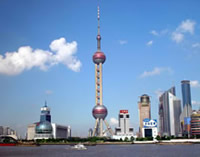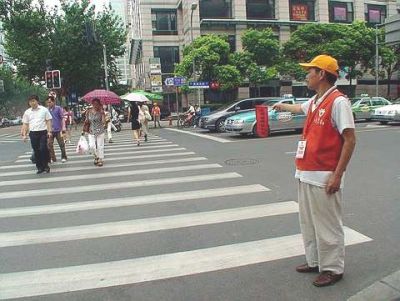|
|


ADVERTISEMENT
Buy Your own advertising
spaces!
.
Download Adobe Acrobat Reader to open [PDF] files.
Recent Visitors
Volunteers helping to shape Shanghai’s mindset
2009. 29 August
If two traffic assistants are not enough to police jaywalkers and delinquent cyclists and motorcyclists, three or even four more are readily on hand. China can expand its pool of traffic assistants from the many middle-aged and retired persons who would rather look for something to do than stay at home. by Chow How Ban
by Chow How Ban
(thestar.com.my)
There are pedestrians still jaywalking and ignoring the traffic lights but the city is slowly but surely evolving into a more civil society.
But the authorities know that placing such citizen deputies at traffic junctions alone will not change the bad habits ingrained in society.
Hence, a campaign involving volunteers is the latest approach by Shanghai authorities to educate the ordinary citizen. Anyone can become a volunteer; celebrities are invited to volunteer at the city�s busiest street for an hour to encourage pedestrians to follow traffic regulations.
A volunteer directing traffic for an hour can do very little, the city�s Spiritual Civilisation Construction Bureau deputy director Ma Chunlei, concedes.
�The one who directs traffic is still the policeman. But once you are involved, you keep the rules in mind,� he explained. �The next time you cross the road, you will glance at the traffic lights first.�
The campaign is held on the 5th, 15th and 25th of each month. Last year, about 700,000 volunteers helped direct traffic at 500 crossroads in the city.
Ma, who has an uphill task ensuring every person in the city makes civilisation a way of life, said the most important thing was that in participating they became educated and trained in the process.
�To change people�s bad habits is difficult and to shape a person�s behaviour requires repetition,� he added.
Ma said: �The root of the problem is knowing the rules but being reluctant to obey them; setting high requirements for others while lowering the same for ourselves; and not having someone to remind us of our wrongdoings.�
Despite the participation of volunteers, policemen and traffic assistants are still the ones who blow the whistle.
A traffic assistant in his 50s who has been on his job for six years said: �Our presence at the road junction is important. We keep on reminding pedestrians on the importance of abiding by the rules.�
Another traffic assistant who only wanted to be known as Chen said everyone � the locals, those from other provinces and foreigners � should play their part in forming a civil society.
�Some laowai (foreigners) do follow road regulations but others are just so rude and set a bad example by ignoring the traffic lights,� he said.
The traffic assistants, who come under the Public Security Bureau�s purview, earn around 1,200 yuan (RM624) a month. Most are aged between 40 and 50 and were recruited from the ranks of shrinking state-owned enterprises, while some came out of retirement to do the six-hour-a-day job.
They wear a vest or uniform with white gloves and baseball cap, and are armed with a whistle or a red flag. However, they are not empowered to make an arrest or to issue tickets. Sometimes they help pedestrians with directions.
In Beijing, the bureau recently recruited 1,200 more people to beef up its traffic assistant force. It had taken in 1,800 earlier this year.
Following a public outcry over power abuse by some traffic assistants, since last year the police have taken over their duties of issuing tickets, receiving fines and taking photos of traffic offenders.
Although jaywalking and cyclists beating traffic lights remain a nuisance, Shanghai has now become a more civil society compared with years ago.
Last month, the traffic administration announced that of the 150 model streets and junctions in the city, 100 chalked up a Road Junction Civilisation Index score of 90.75. The rest averaged 84.97.
Overall, the level of civilisation has nevertheless improved, as shown in the recent results of the World Expo 2010 Countdown Civilisation Index.
The scores were 79.06 for environment protection, 83.45 for public order and 83.68 for services provided (by both the public and private sectors) � up more than 2% from the second quarter this year.
Ma said this indicated that the efforts by the government and communities have started to bear fruit, but the lower-ranked districts still need to buck up.
Source: thestar.com.my

